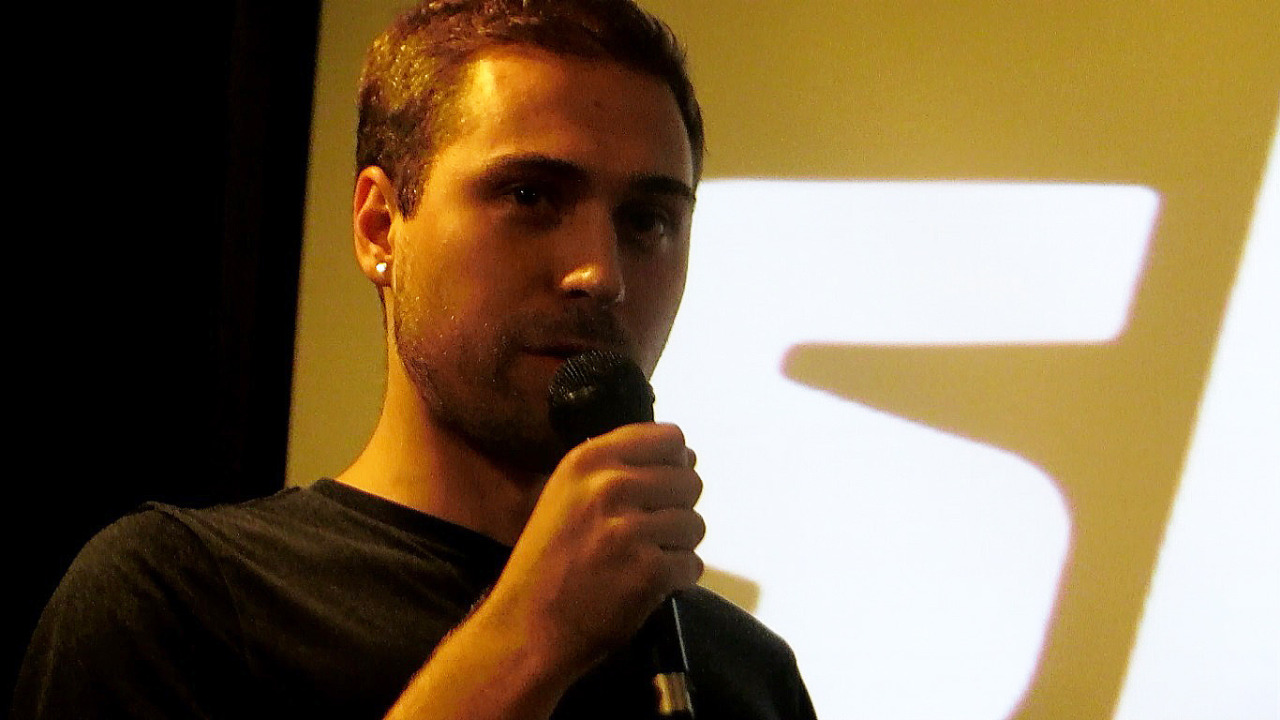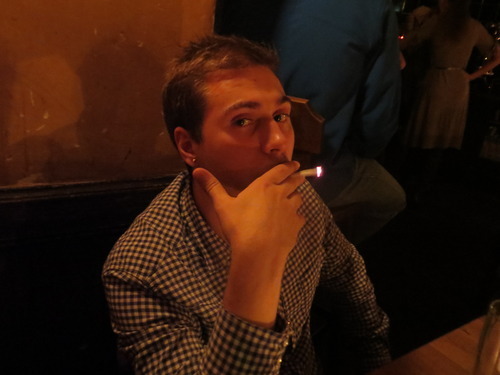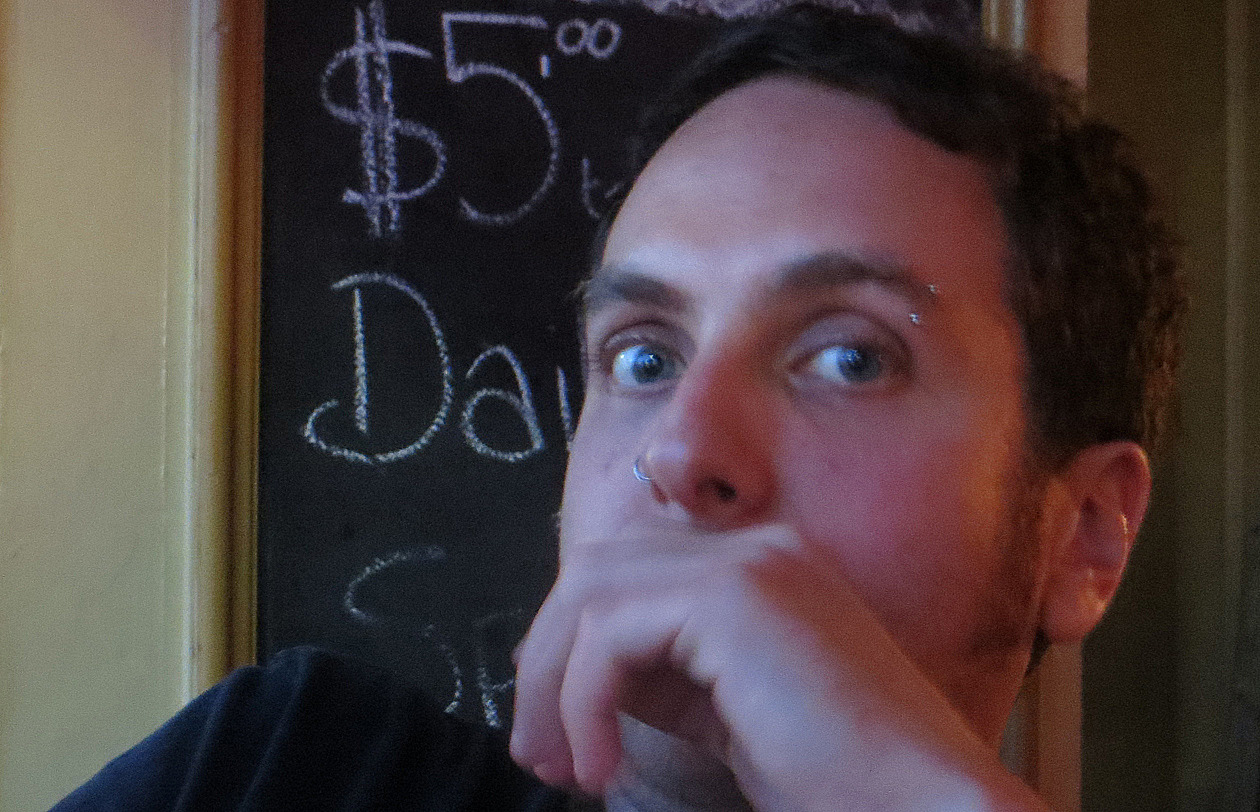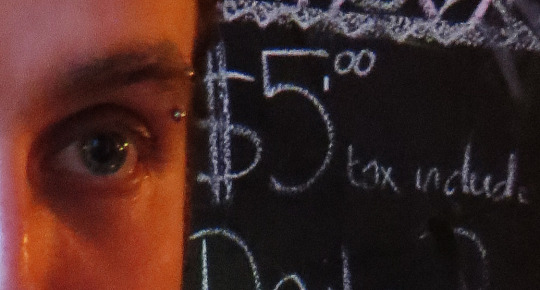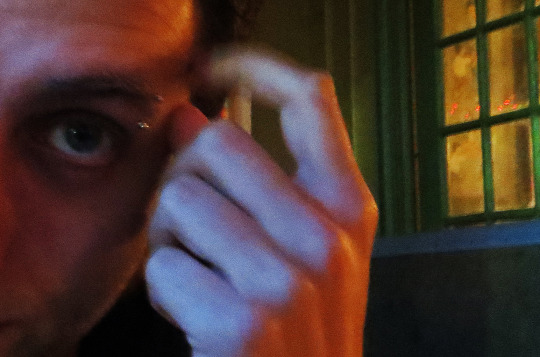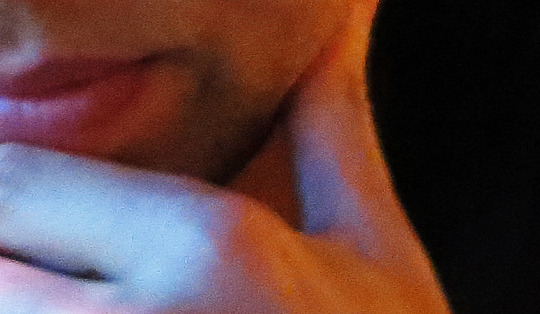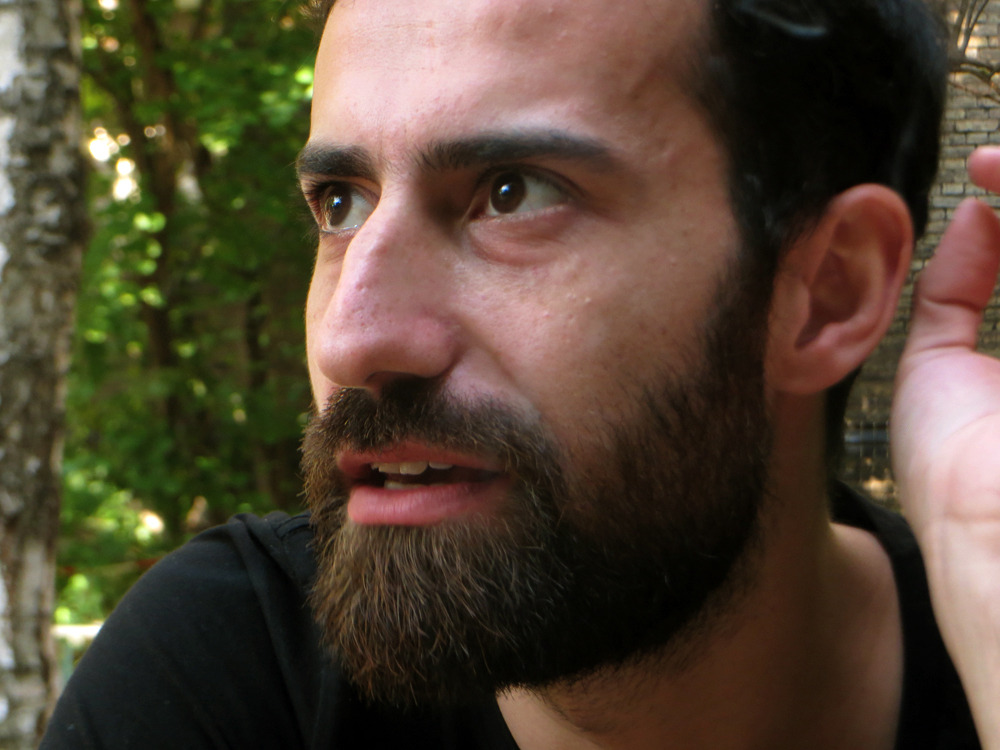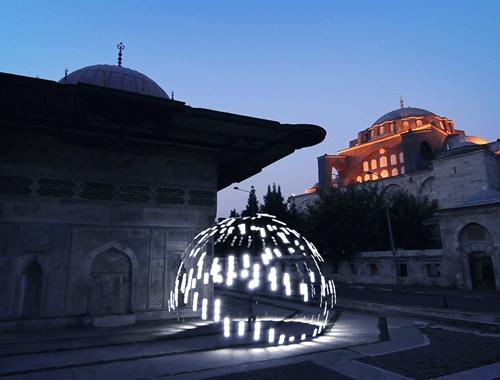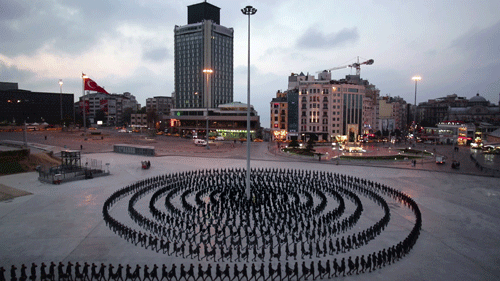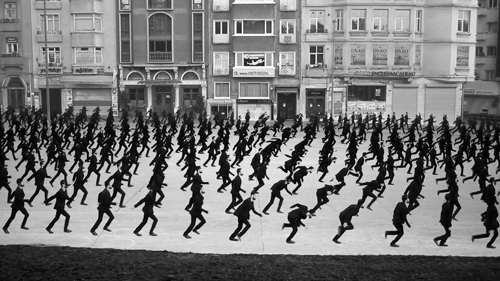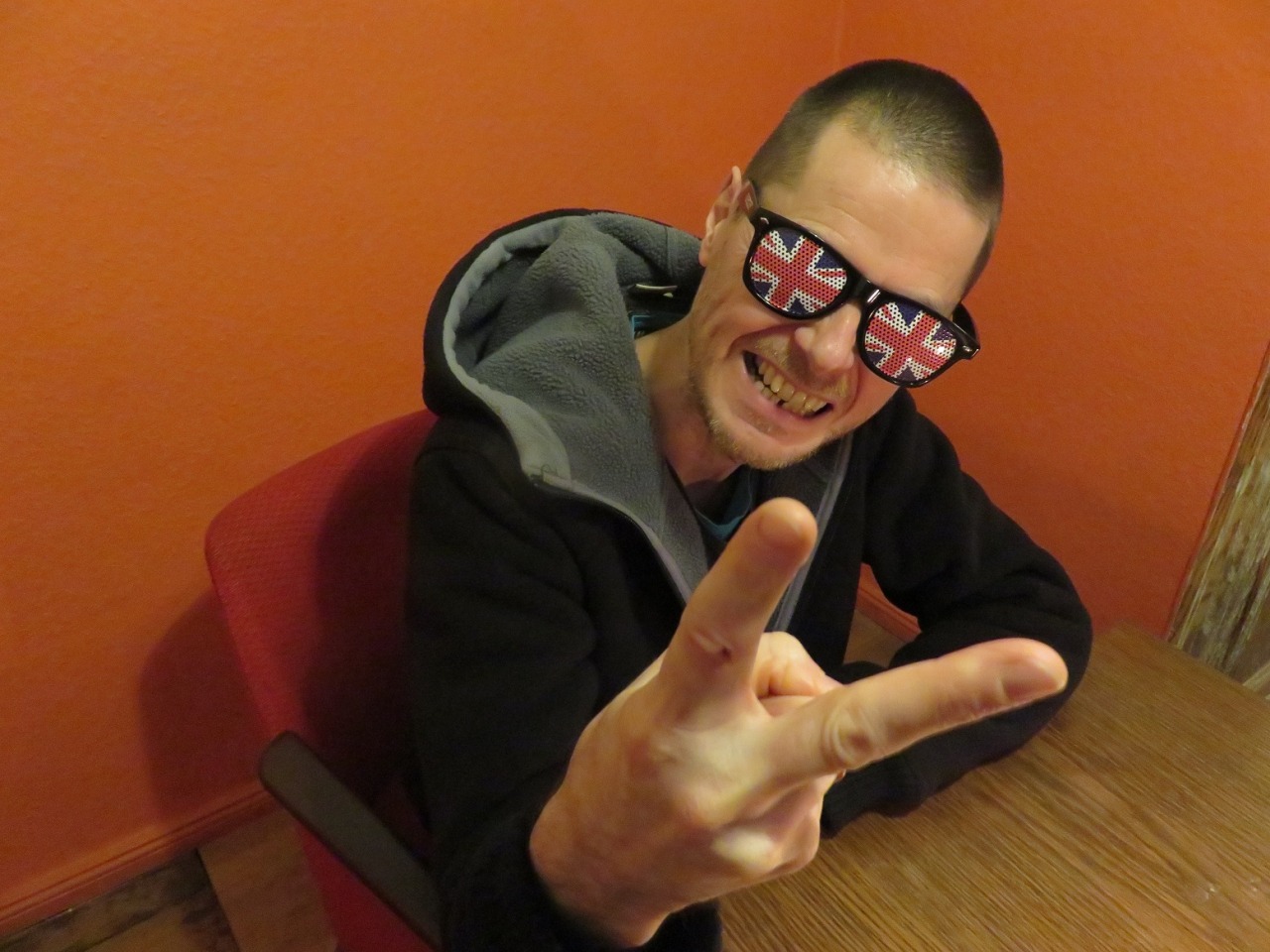
THE TWO-EDGED TONGUE
Very British leading wave DL satellite director/screenwriter Alex Ross on our strange creatures, his odd views, life and art in London and Paris and becoming “ein Berliner”
by Kenton Turk | Directors Lounge Magazine | December 2015
pictured: Alex photographed in Berlin (photo: Nick Font/DL)
BRITAIN BLEEDS INTO EVERY WORD spoken by the razor-shorn guy who makes movies about a city across the Channel from where he was born. He squints and reaffirms if asked that he is “ British by birth, British by nature,” despite twenty years and counting in a city with a different language and take on how life is to be lived. Alex Ross however tells stories in moving pictures about people here in Berlin, not simply as a convenient backdrop, but as an integral part of how said people enact plans, react to one another, perform sex acts with one another.
Beyond his award-winning short films, there have been four features so far, with Ross as writer and director, and occasionally actor – German films with English titles: Move On Up, Land’s End, Tom Atkins’ Blues and the most recent, the quirkily-named Weak Heart Drop. What sounds like a clumsy attempt to describe a cardiovascular crisis is in fact the kind of clever, offbeat film cinemas are (or should be) screaming for. The tag line – “Du kannst eine Lüge nicht für immer geheim halten” (“You can’t keep a lie a secret forever”) – sells the film considerably short of it complexity. There is an interaction between the living and the dead (the latter actually reaching in to shape the present), between perpetrator and victim, between victim and victimizer (often the same person). Tom Atkins’ Blues lives on the sand in the gears of its machinery. With Weak Heart Drop, the machine has received oil to reduce the friction and open the pumps. The film played at targeted cinemas throughout the spring and summer, bobbing and weaving in a calculated norm-dodging light artillery assault on the standard cinema run. Audience reactions (having attended a number of screenings myself) are immediate and strongly favourable. This is a good piece of work. Why aren’t there more films out there like this?
Release times for these longer flicks have never been suitable for a DL screening, but other films with the Englishman’s fingerprint have made their way into the festival, and there has been talk of possible a future guest curation. Ross knows the DL festival from way-back-when, through location and conceptual changes.
We find a semi-cloistered back room of an in-demand local hangout to chuck around questions and answers on who this man is and how that might affect his work. Like one of his main influences, Terry Gilliam, he has British wit (and the British Isles term “shite”) at the ready. The final scene in Time Bandits (“a very playful film,” he says with relish) where Ralph Richardson turns up as God, saying, “For God’s sake, look at all this mess you’ve made!” can pull up an immediate chuckle out of him. Very, very British. His formidable accent when he occasionally switches to German I don’t read as inability, but as tranquil defiance, the kind that rears its head in his eccentric films. Trim and kinetically energetic, he takes a seat with comfortable ease, the sun at his back. “The sun never sets on the British Empire,” indeed….
“In my opinion there are two sorts of people who work on films… people who are there for the work or people who are there for the pose.”
KT/DL: You’re a Londoner?
Alex Ross: Not by birth, by choice. I was not born in London, but I spent quite a few years in London, a very intense part of my life. That’s where I go back, generally.
Did you crawl off as a gypsy child?
No, I just moved to London when I turned 21. I was born east of London. We moved to Stoke-on-Trent, then to a place near Coventry in the Midlands. Then I moved to London; it just seemed like the right thing to do. I was there for a number of years. Then I took two years out and went to the Bournemouth Film School. After that, I went back to London, and because the grad film I did there was very successful and won a lot of prizes, I was invited to a lot of places, did a lot of travelling.
Your Eraserhead, so to speak.
Maybe. So I basically came to Potsdam, just outside of Berlin in ‘91, and to be honest, I never really left again. I saw the former East Germany a year and a half after the Wall came down and went to East Berlin. It was only a matter of time before I moved over.
What was the name of the film?
Jacob’s Ladder. Not to be confused with the Adrian Lime horror classic, but actually my film did come out first. I get a lot of abuse on YouTube from people saying,“This isn’t the Tim Robbins film!”
It’s the original!
That’s why it says “A complete film by Alex Ross,” “The award-winning short film.” If you bother to read the titles, then you’ll see that it isn’t the feature.
What year was that?
1990… so 25 years ago. That kind of got me… I mean, to travel with your film is the best of both worlds. Sometimes you’d be picked up at the airport in a gleaming black Mercedes, put in a hotel and be rewarded with a lot of favourable comments, and sometimes I’d win a prize. It was completely… like these things are, when they’re unexpected, it’s the best of everything. The film really resonated with a lot of people; it was great. My world expanded, and I came here on the back of that to try and get a project started with some people I’d met in Potsdam, in Babelsberg. Inevitably, that didn’t happen. I went back to what I had always done in London, which was jobbing: I was a furniture removal man for about three years. Out of that, I wrote the screenplay that was picked up.
A furniture removal man?
Yeah. It’s a proper term. Möbelpacker. You’re removing it from one house and installing it in another. I did that for a number of years, and then wrote a little idea quite flippantly that was based on that, and that was picked up quite fast by ZDF¹, Das Kleine Fernsehspiel.²
And what was that?
That was a film called Move On Up. What a title, eh? Although it was only a TV film, it won the Grimme Preis, which I suppose is the equivalent of a BAFTA. That was also completely unexpected. It was… loosely based on some of my experiences. It’s about an English guy that comes to Berlin, checks his holiday romance, she doesn’t want anything to do with him, he wants to stay to try and win her back, ends up joining a furniture removal company. So it’s kind of like a road movie through the city, set during the European football championship in 1996, where England met Germany in the semi-finals, so it only heightens his sense of homesickness. The flatline was the football tournament, then you had all the furniture removal stories, and the love story about how he tries to win back his holiday romance. It was an exhausting film because I think we shot for 32 days, and not a single day was it the same location. We were constantly moving around.
Move On Up, you said it was only a TV film. Do you have a sense of hierarchy… a caste system for films?
No, I mean that the film scene has changed a lot in Germany, and a lot of these Kleines Fernsehspiel or grad films also get small distribution deals and make it into the cinemas, although most of the money is TV money. That’s what I meant. When I said only TV, I meant it was only shown on TV. We didn’t really know about it… or the relationship between me and the producer was not healthy enough for us to pursue that after the film was finished. I think that… were quite glad that we didn’t see each other.
One of those, OK. Can I print that?
Absolutely. I mean, he wouldn’t say anything different. So when I say that, I don’t mean as a derogatory term. It was only ever shown on TV; it was never shown in the cinema. And that goes for the second film I made for that slot [Land’s End, ed. note] that was very problematic in its birth, in its making. It kind of disappeared off the radar as soon as it was finished, really, which was certainly the agenda that the commissioning editor had, to bury that film as soon as possible. And then I was no longer welcome…
Oh.
So, I wasn’t invited to the party at the Berlinale. That was a really nice touch, I didn’t get an invitation. Like someone crossed me off their Christmas card list! And then when I wrote to the commissioner at the head of the editorial department, she suggested I look for money elsewhere. So I was given some very clear signals. Although you can make up to three features with them, it was made clear that the Redakteur, the commissioning editor, didn’t want to work with me, and didn’t want me to work for them. That’s where I found myself working in other departments, as an assistant director, editor, assistant editor, translator, production coordinator, whatever. That was what I like to call “The Wilderness Years.”
“The Wilderness Years”… that’s a good chapter for the autobiography.
Exactly! But then it came a point when I really felt the need to make something again, which is where Tom Atkins’ Blues was born… out of the fact that we hadn’t made anything. Tom Atkins’ Blues was made possible because I spent those years grafting, made a lot of connections, spent a lot of time on the set, if not as a director, but made a lot of connections, pulled in all the favours I did for that.
I’m curious, from others’ point of view, your ex-compatriates… what makes you difficult to work with?
What makes me difficult to work with?
Objectively.
I think what made me difficult to work with was the fact that my German language skills weren’t great, and I was often misunderstood, often frustrated, not being able to say what I really meant.
You didn’t encounter people trying to show off with their minimal English?
It wasn’t the same though, because the film was in German. And I also – particularly, it has to be said, in my opinion there are two sorts of people who work on films. There are people who are there for the work or people who are there for the pose, and the problem on that film is that a lot of people who were hired by the producer were there for the pose, and made my life unbearable. Only a few people seemed to be pulling together for the film. So under a lot of stress and in a somewhat frustrated frame of mind, I was probably quite… short with people.
Diplomatically put.
But not the actors, I’m talking about crew members. And I had the assistant director fired… although she jumped before she was pushed, but my God, I would’ve pushed her! My DP [Director of Photography, ed. note] is from Scotland, and he had never experienced anything like it. To make films is hard enough anyway; to go and try and make them in a foreign country where you don’t really speak the language, it just makes everything harder. But my German’s much better now; I’m more experienced, more confident. I think I’m a very easy person to work with. I don’t suffer fools gladly, I don’t like laziness. It’s about the work, and I don’t like people trying to push the project in a direction that is quite obviously not right for the project. People have their agendas, I know…
A very quotable line. Would you call yourself a British filmmaker?
Yeah. It’s a bit of a cliché, but there’s this quote where you can take the man out of Britain, but you can’t take Britain out of the man.
They use that with all kinds of qualities and categories.
I think that sensibility… I think Britain is good at doing social dramas that are serious but have a certain amount of comedy. I don’t see that so much in Germany.
So would you say you’re doing British style social comedies in Germany?
I think I would say… I’d like to think I bring just that kind of sensibility to my films, whatever the subject matter or wherever they’re set or whatever language they’re played in. And I have my own view of what I think is good and not good, what works and what doesn’t work.
Do you find yourself becoming Germanized over time?
No, I just think there’s a lot of… it’s interesting, I know a few expats, and they live in their flats, and go and work where there are just expats. Whereas me, here, where I used to live before, where the late night shop [setting of Tom Atkins’ Blues, ed. note] was… I’m very embedded in my neighbourhood, I know a lot of Germans. There’s a lot of things about German culture, the Berlin culture, that I like and understand. So I feel that I’m not a tourist.
If you’re a tourist, I think your tourist visa has expired, from 1990 until now!
Maybe “traveller” is a better word…
But you’re here, resident with family and all this, so…
Yeah, I’m quite happy here.
You could hardly be any more solid.
No, absolutely. I don’t really know many expats.
The idea is definitely not to come over here and hang out with people who you spent a lot of money to leave…
Genau! To sit around and talk about how much better Montreal is, or something like that.
Which reminds me of a little film clip that I sent you. That’s exactly what I meant.
That’s one of the best quotes I’ve heard! We had a quote in film school about a lot a things, which was, “What a load of wank!” But I think “Biggest wank this side of midnight,” that’s embellishing that. I think I’m going to use that a lot later on!
It just popped in my head. I thought, it doesn’t get worse..
It’s everything that’s wrong about so many things.
We will be mentioning names… (laughs)
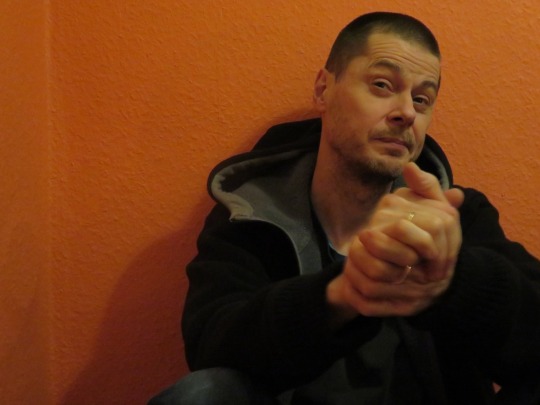
“Only a certain amount of films could get made. And I didn’t go there to sunbathe. I would have taken anyone out to get the money.”
THE WAITER, AMICABLE if a little distracted and/or scatter-brained, comes with a round of drinks (not tea) that we carefully position on a less than stable 1950s asymmetrical table. Ross seems somewhat thoughtful peering into his glass. Before I can hit him with another question, he shares what has been going through his mind.
AR: It’s not very often that you’re asked that, what makes you… why are you difficult to work with.
DL: We’re going to get to more unusual questions as time goes.
That’s a good question, though. I think that these days, I’m much easier to work with. I think probably when I was younger, I was harder to work with, but that’s all about, you know… I think because of the way that Tom Atkins’ Blues and Weak Heart Drop have been made, there’s no need to be defensive or territorial about things, because it’s our own thing. I think when you’ve got commissioning editors and producers who you notice are not really… what’s the phrase, “not reading from the same page,” then you get very territorial. It’s another cliché but it’s true, that a film shoot or a film production is a benign dictatorship.
With “benign” as an option.
Yeah, exactly! Somebody has to say yes or no! And Land’s End was an interesting experience. Don’t get me wrong, that was a really great shoot to work on, but it was filmmaking by consensus.
Morrissey once said democracy doesn’t work in a recording studio because everyone’s got their hand on their own faders, pulling them up to 100. Not everyone can be the star. It doesn’t work that way.
I have to say that both the last two films, Tom Atkins’ Blues and Weak Heart Drop were made with Martin [Parry], my old friend from film school. He shot that grad film, he shot Move On Up. Land’s End is the only film that I’ve made that he hasn’t shot. And we do everything together. There isn’t a single decision that’s ever made on these films that I don’t run past him first. I still get final say, but if I say no and he says yes, that’s OK.
That difficult-to-get “artistic control.”
But, you know, we agree nearly on everything. There’s hardly ever been anything where we’ve had radically different opinions about something. That just makes a huge difference, because certainly on Move On Up, a couple of friends who worked on that shoot said they just saw me on my own in the middle of this film shoot with no one really helping me. I’m not making it sound like it’s a tough world, but you’re on your own, and then your insecurities do creep in. But there’s always two of you – then you feel very confident about what you do, and you don’t feel alone.
Rather like marriage, isn’t it?
It’s something like that.
And it is a tough world, by the way. (laughs)
It’s a tough world being a miner or a farmer or something, It’s a luxury to make films. But the work’s tough, the hours long. It’ll be interesting, if I go back to funded filmmaking, quite how that will be. Also… you get to 50, and you’ve just got a different attitude to everything. With my student film, I would have rucked with anybody to get that money, because we knew that the film school only had a certain amount, and only a certain amount of films could get made. And, you know, I didn’t go there to sunbathe. I would have taken anyone out to get the money. But it worked out fine. We got a large slice of the budget that year, and deservedly so, because the film worked out well, and it won a lot of prizes. That youthful aggression and fire, that fades, the older you get, to a certain extent.
I think part of it is just, “I’ve done that already.” In the same way that, if you’ve worked in a library all your life, you might say, “Now I want to join Hell’s Angels. I’ve done the library thing.” Speaking of the Angels… people have an idea that urban Britain can be a tough place to grow up. Give me a tough experience, your tensest moment.
Well… over the years, I’ve had tense moments with the police, but that was mainly due to my own folly. (laughs)
Switchblades against your neck…?
The only time I had any serious trouble with anybody, where a knife was shown, was actually because I knew him and not because something had happened on the streets.
It’s good if you know your killer. It helps you prepare.
But I’ve had a gun pulled on me twice, both times in Berlin. Just after the Wall came down. It was just bizarre. I used to live in areas of London which had a terrible reputation at the time. The worst was when a woman – I lived in the same house as her – was stabbed a couple of times. We were never quite sure who, but her boyfriend and his French mates were all into heroin back then. It was ’84 in Brixton, all very dark and nasty. Quite harrowing.
What was the first time you had a gun pulled on you?
Well, the first time was… a mate, who was here, he was looking for work and a flat in a style not unlike like Yosser Hughes from Boys From The Backstuff,³ where he’d just ask anybody anywhere anytime if they knew about a job or a flat, in English. And this guy invited us back to his place to talk about it. It was another classic guy just after the Wall, an East German guy who just thought he could make some money. We turned up in his flat, and he started playing really loud death metal music, and he was just really weird. Then he pulled a gun out, and insisted we started playing Russian Roulette with him. And he put a single bullet in it. I couldn’t have told you if that was a live round or not, or if it was a blank.
That’s not something you want to find out the hard way.
And me and Martin we were sitting on the sofa. You could feel that… we tensed at the same time, all the sphincter muscles went like that [demonstrates with this fingers], and all of a sudden they went wheynnng! It was like, “What the fuck?!” And we just went, “Whoa!” and ran out before it was our turn.
A proper guest would play along.
Yeah, I know.
It would be the British thing to do.
Well, we had somewhere to go…. And the other time, some guy knocked me off my bike during a Saturday afternoon, Jannowitzbrücke [east central Berlin area, ed. note]. And you know, I spoke very little German back then, and I was cussing, man, I was cussing quite badly, and he said to me, “You don’t speak to me like that in front ot my wife!” And then he pulled a gun out. So I positioned myself behind his… amply framed wife to pull his gun away, and then of course the rule is, if you have an accident, you have to call the police, and then he called the police. So I just got on my bike and fucked off and thought… “This is too crazy!” (laughs) I was involved in the second riots in Brixton, but that wasn’t so hairy, because the police were on the back foot the whole time. Perhaps what was a bit hairy was that we we were coming down off acid, but that’s another story. Going down to a front line where there were flames and police – that was pretty… whoa! But I couldn’t say I’ve had anything really that bad happen.
Good, I’m not looking for anything nasty; I’m just curious. We were talking about tough times, etc, and that made the connection.
“People started saying, ‘Oh that’s a lovely little film.’ People do that, once you’ve won a prize, people start praising it.”
DL: I want to ask you about Land’s End. Sum it up in five words?
AR: A very enjoyable experience.
OK, with one word left over!
I found that Move On Up was a very, very different experience for me to deal with afterward. I set out to make a feature, and it was so difficult to make, and when it won the prize, it meant very little to me, because I’d fought so hard to get it to where it was. That’s when people started saying, “Oh that’s a lovely little film.” People do that, once you’ve won a prize, people start praising it. But I felt… if I go through that experience again, I’m never going to make a film again. The crew on Land’s End were fantastic. It was all shot out in the countryside, so we all looked healthier at the end than when we started, which is normally the other way around. The problems we had was when we hit the editing room. The commissioning editor was not a fan of anything we’d done, and didn’t seem to know the script. It was a real struggle to get the film edited the way I wanted. But I learned a lot about how to deal with a situation where the gods are not really on your side. The film kind of disappeared off the radar, because they wanted to bury it. They cut the budget, so we had to cut pages. The beginning was cut. A friend of mine said, “Where’s the rest of the film?” We didn’t foresee that kind of compromise. And that’s the thing, if you start compromising on day one, where are you going to be six months later?
The decision about what parts to cut, that was done over your head?
Well, it wasn’t done over my head; I got to do the cutting, but, you know… I couldn’t cut out the middle of the story!
You could do what Kennedy did for reading, apparently to save time at university – read every second page and figure out what must have come between. I guess that wouldn’t work too well for film…
I don’t know! But if you get into a position where they say, “You can make this for 100,000 less,” and we only have 500 [thousand] to begin with, you’re not going just say, “Well fuck it, I’m not going to make the film.” But we were told we had use a certain amount of shooting days, a certain amount of scenes. This was three or four years before everyone started shooting on DV [digital video, ed. note]. So if the film had been three years later, we wouldn’t have had this issue. From day one, the production company want to know about shooting ratios. When you’re shooting on film, it’s always about shooting ratios. How much of the negative do you print? It’s all those things. They said we could have 8:1. 8:1 shooting ratios? You’ve got to be joking! By the second week, people in production are talking about… “We have to bring down our shooting ratio.”
That’s something the layperson doesn’t consider – technical limitations, what’s imposed on you, and what you end up having. Since you brought up “day one”… as far as the Directors Lounge annual festival in Berlin, you’re one of the earlier visitors. Tell me how you first came to show up there.
I first came to the DL… must have been 2007, but it might have been 2006, when it was in the Frankfurter Allee.
Probably the second year. The second and third year, it was in 137 and 133.
But a very clean white exhibition space. Loads of us went. And then, probably two years later, possibly 2008, the location had changed; it was at Oranienburger Tor [Scala, cinematograph theatre, built 1908, ed. note]. It was difficult to know when you compared the two – one bright light classic exhibition space and one seedy, off the beaten track – whether the festival had gone up or downhill! (laughs)
Sideways. Actually, always the tendency has been toward atypical spaces.
And George [Drivas] showed the second film there [Beta Test, 2005, World Premiere at DL2, re-screened at DL4, ed. note]. That’s where I got to meet André [Werner], [DL founder, ed. note] who also showed this… I think in his circle it’s quite a well known piece where he cut lots of key moments from horror films together into a fluent narrative. [Flash, 2008, World Premiere at DL4, ed. note]
That was the first time you met him?
Yeah. I had worked on Beta Test, I’d helped find some of the locations because George was trying to portray a kind of a future world, so, very specific locations. Because of my experience working as an AD [Assistant Director, ed. note], I knew of quite a few locations, Stasi buildings, stuff like that. Then I came into the editing room and gave my opinion about a few things.
Tell me your impression of André upon first seeing him.
(Pause) A bit mad.
OK, that’s good!
Well, not mad in… I mean mad in a positive way. He looked like a man who didn’t see much of the day.
That would be André, yeah.
I don’t remember him to be the biggest of talkers, actually.
Usually not.
But you know, it’s like pleasantries, someone introduces you, you have a bit of a chat, and then someone else grabs him. It’s always like that, you never really get to chew the fat for very long. Then he moved the festival again, and it was showing at the Pfefferberg.
At Meinblau. That would be DL6 and DL7.
And then I met you, of course…
But not there. Through Ofir Feldman and his crew the Verbal by Nature football segment, the poetry one, [“Poetic Account,” ed note] which we showed in L.A. as well… you had worked with them. Through that I came to the Tom Atkins premiere… at Lido.
I AD’d it. I was in on all of the casting sessions. He credited me with casting, actually, in the credits. I really pushed that it should be… Ernest Hausmann, I think is his name, who plays the footballer. [Ernest Allan Hausmann, ed. note]
It was this contrast picture between things that don’t fit, linguistically – the poetic soccer player, the…
I think that’s the one that works the best of all of them, the football one.
I agree; that’s why we showed it in L.A.
We shot that a few months after the all the others, and it was bitterly cold out in Klein Machnow. It was hard! But it was good. If you do a reshoot or you do a pickup and it’s got something about it, it makes it all worthwhile…. there’s nothing worse than the shite at the end.Agreed.
Tom Atkins’ Blues – that was a very special screening. A very special evening. There was something in the air.
It was a great night. I came and talked to you, but not for long. I think you were very busy, pumping the flesh here and there.
There were a lot of people there.
That never hurts….
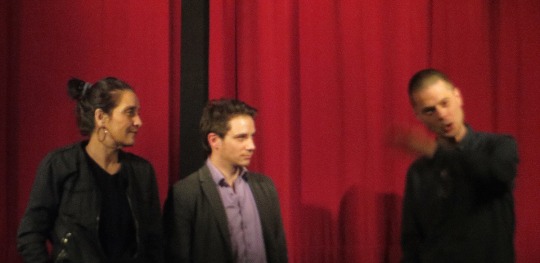
Meral Perin and Benno Lehmann onstage with Alex Ross (photo: Nick Font/DL)
“Even the most notable newspapers, half of their front pages are just light stories about this and that… who gives a fuck? Spare me!”
DL: What about the other side? Inside or outside of film, tell me something that irritates you.
AR: The amount of shite that’s out there.
In general, or any specific kind of “shite”?
Well, there just seems to be kind of an increasing gap between the amount of shite that’s projected through all sorts of media platforms and what’s really going on in the world. I find it really irritating that people seem so easily distracted from any serious train of thought. And it manifests itself anywhere, d’you know what I mean? Or everywhere. Even the most notable newspapers, it seems, half of their front pages are just light stories about this and that, you know… who gives a fuck? “Communists! Communists!” Spare me!
They’re fighting of course for the non-existent reader.
Banalities. Banalities.
It seems that that’s what people go for. Look what sells, look at what’s on television…
But it’s always like, “This is the most popular thing on TV.” Yeah, it may be the most popular thing on TV, but how many people watch TV? Or what percentage of people watch TV? “This is the best-selling album in pop music.” Yeah, but what percentage of people actually listen to pop music?
Then there must be a vacuum of people who are doing… what?
I don’t know – not listening to listen to pop music. What you don’t have is any relativity about anything. “This is the biggest thing since sliced bread.” No, it’s the biggest thing since sliced bread in that little cosmos, but that’s all anybody’s talking about. But what percentage of people actually watch or listen to it? It was a lot simpler 30 yours ago, because there weren’t that many TV channels, or radio stations or newspapers, but now we’re just awash with images and opinions, and… I don’t know, I wouldn’t say that that irritates me, but… no, it does irritate me, actually.
Do you do anything to keep yourself thinking clearly?
I jog most days.
And that does it for you.
Yeah. It’s interesting, I was on the airfield… I don’t know if people know, in Berlin, the former Tempelhofer airfield is now a park, a very, very big open space. It’s enormous.
It’s actually bigger than most people think. It’s bigger than Central Park.
Yeah, it’s massive! I was on it yesterday, and there was a father, mother and son, he could’ve been about 10 or 12. He turned his bike without seeing me and almost hit me, and his dad said, you know, joking, “All this space and you managed to hit someone!”
Well, you know, talent shows up in strange places.
So I looked back and smiled, to give him a signal that it didn’t bother me at all. Before I knew it, he was cycling beside me. He said, “Isn’t it a bit boring jogging here?” and I said, “I know that there are people who find the field very boring, because there’s nothing here. But what I love is… the open space!” The thing is, if you’re like me who’s only ever lived in cities for the last 30 yours of my life, if you’ve lived in London… to have a park that size! It’s incomprehensible to a Londoner. Or in Paris or Moscow….
It’s not just the size. Hyde Park, Regent’s Park, they’re also large parks. But it’s a flat field; that’s the thing.
You know, I work a lot; I’m a six/seven-days-a-week guy, really. But some of my best ideas come when I’m out there, about halfway round. Ian McEwen said that for him, motion is the best way to be creative. Whether you’re in a train, on a bus, in a car, as a passenger, walking… I think there’s something about motion; it’s good for the mind. And that keeps me fresh. If you make films, there’s a lot to think of all the time. Robert Altman, when he was making McCabe and Mrs. Miller, lived on a diet of grass during the day and bourbon at night.
As in the smoking kind. He wasn’t grazing on a field…
Apparently. The other way to relax is a couple of glasses of red wine and watch something thought-provoking, or, like somebody said about some of the HBO stuff, watch something that makes me feel intelligent when I watch it. (laughs)
That would explain the popularity of all those other shows we were talking about!
Like Mad Men. I’m rewatching The Wire at the moment. It’s incomparable; there’s nothing out there like it.
I only know it by name. I have to confess I watch none of these TV series. I don’t know where people find the time for it. I don’t have the time to sleep, even.
That’s one of the biggest problems these days. I’m doing an episode a night at the moment.
What was the last book you read?
The last book that I finished was called Bageye at the Wheel.
That’s very interesting; that was going to be my second question, but I’ll backtrack first. Who is that by?
It was written by an Afro-Caribbean; he’s of Caribbean descent, but he was born in England. [Colin Grant, ed. note] It’s his recollection of growing up in a West Indian family in a little council estate in Luton in the 70s. I’ve started – I’m about halfway through Brixton Rock by Alex Wheatle. He’s another writer of Caribbean origin. That’s all about a guy, he’s 16 in 1979 in Brixton. That’s great because it’s just a few years before I moved to Brixton. It’s a place and a time that I remember myself. And you know what, sometimes you start a book, and within page one, you’re in? I was on the way to a birthday in a restaurant in Charlottenburg [upscale district of Berlin, ed. note], and I thought, fuck it, I’ll just ride the underground all night and finish this book!
I’ve had those kind of page-turners where I’ve stayed up all night to finish them. The Collector, for example. I like to read books that became films to see how they varied. Another one was Marnie, later made into a Hitchcock film, but very different in the original. I had to stay up all night. I thought, “I’ve got to find out, I’ve got to…!
I love that, when a book gets you like that.
Maybe you’re a mind reader, because the second question I was going to ask you was, what was the last book you didn’t finish?
I can tell you, there were two. One was a bio about Eddie Merckx, the famous Belgian bike-rider. I don’t know why I didn’t finish it. I just put it down and didn’t pick it up again. But the last book that I didn’t finish was a book I barely started, and that was White Teeth by Zadie Smith, who was very hyped.
You get books that are hyped and have won all kinds of prizes, like the famous Life of Pi. Couldn’t get through it. Partly well written, but too spotty. I couldn’t force myself to finish it.
Even if I don’t like a book that much, I try and give it 60 pages…
I think I gave it more… 100 I would usually do.
I just didn’t care; none of the characters were particularly likeable…
On the subject of the likeability of characters – I went with my sister [Angela Turk, DL reviewer, ed. note] to a presentation at the Toronto Film Festival – Pasolini, by Ferrera. A lot of potential, but completely off the mark. The central characterization left us both cold. The same evening in her apartment, I played her a couple of scenes from Weak Heart Drop. She said, “I know this is going to be good, because I already care about the characters just from the few moments I’ve seen.”
That’s what my mum said too.
That’s an important thing; it’s hard to get that. Do you have a method of doing that, or does that just work out? Or is it just down to the nuancing of the actors?
Well, you’d like to think so. It’s the first film I’ve made where I’ve had white collar characters. In Land’s End, the main character is a failed architect, but you never see him as an architect; you only see him as a fish out of water. You never see him in his office or anything like that.
There are minor characters in Tom Atkins’ Blues who come in and out, white collar people, but as the enemy, as it were.
I did wonder if having the main characters as a gallerist and a therapist, if people would find them likeable, but…
Why shouldn’t they? Because they’re white collar?
Well, because it’s something new for me, new ground for me. But I think particularly with the gallerist, it has a lot to do with Megan [Gay]’s portrayal of the character. How can you not like her?
She’s spot-on in that, I think.
Everyone who sees the film says that; it’s not something that I would trot out otherwise. Because it’s effortless, it’s not like she’s acting. That’s where I like to go with actors, is to say to them, “You’re acting! I see you’re acting! Just be.” Another performer in the cast wrote a very nice letter to me after we finished the shooting and said they felt they had learned something new about acting working with me and Martin: they learned to just be in the flow. It’s the highest compliment you can get, when you get letters from actors.
TOM ATKINS’ BLUES TRAILER
“A tennis player or a swimmer, I don’t think they’d necessarily be suitable for a film, because it’s all about team, isn’t it?”
DL: Why did the world need to see Tom Atkins’ Blues?
AR: I don’t think the world did!
OK. So why did Berlin need to see it?
I don’t think it needed to, either. I just think that whole project was blessed with luck. The first week it was showing in the cinemas, it was the last week of August, the first day after the summer holidays. If the sun had shone all week, then people wouldn’t have gone to the cinema – but it rained all week. And on the back of loads of good reviews that all came out, because there was nothing coming out – as it was just the end of the holidays, there was that low. We had real luck. But you know I think you make your own luck, I really do…
It sounds very good, but unfortunately there are other factors that do broadside you.
Tom Atkins’ Blues happened so quickly, you know, it was difficult to get broadsided. We got broadsided a couple of times with Weak Heart Drop because it went on and on and on and on and on.
What is the Tom Atkins’ Blues scene that sticks out most in your mind?
Now, one of the documentary interviews, because two of the protagonists have died. I thought, fuck, they’re gone!
Who was that?
You know the two guys who are talking about Marx and Hegels? Both. [Helmi Schäfer and Bernd Voigtländer, ed. note] One died in February. We hadn’t known, he had had a stroke the previous July and was recovering from that, and then he went…
That weakens people.
Yeah, people have a stroke and don’t come back. The film scene that sticks out the most? I think it’s that whole sequence with me on my bicycle, because that’s something we thought up afterwards. Music is such an important element of the film; he’s always playing music. We needed to get out of the shop, and so Martin said, “Why don’t we have a sequence where you ride around Berlin?” It really it was a joy to do that. Also, when I watch it, with the music and everything… it’s right absolutely in the middle of the film, and it’s really what the film needs; it brings everything to life.
Breaks the claustrophobia.
Yeah, exactly. Probably my favourite acted scene is the face-off in the shop, where the new boyfriend comes in. It’s like a Western scene, in a way.
In that one, you played the pivotal character. How much of that was you?
Very little. I remember when I first showed it to some friends in London, the summer after – my friend Helen, after about 15 minutes, she said, “Alex, he’s nothing like you!” I said, “Thank you!”
I just assumed that a lot of it was going to be heavily autobiographical.
What’s true is, I used to work in a shop, and I have seen the neighbourhood change. And some of the things that happened in the shop did happen, like the drunk Frank [Benno Lehmann, ed. note], that’s based on a real character; also somebody coming in and complaining about the tomatoes being too hard. Apart from that, I used to live in that street.
I figured the expatriot, transformation… I can imagine that you’re someone who probably would not deal so well with speedy gentrification.
But that happened after I had left, really. I worked there in ’95, ’96, ’97, and then moved away from that neighbourhood in 2000. Toward the end of 2008, I thought… “Fuckin’ hell, where’s it all gone? Who are all these people who are coming in? It’s all new to me!”
I thought of it as being something broader. A lot of people find themselves confined to things they’re not ready or prepared to cope with – changes in body, ageing, all kinds of things. I could sort of see that as being an allegory of all kinds of situations where the sand shifts under you. And then what happens, sink or swim?
That was very key – very early on, we realized it’s about change. But the subtext is, if you choose change for yourself, then it’s all positive. But if change is forced upon you, it’s very difficult to deal with.
In filmmaking as well. Anything about Weak Heart Drop you would change?
No.
That’s good, a feeling of satisfaction. Any film you’ve seen where you think, “I could have done that, and better?”
No, I tend not to look at films like that. There are a lot of people in this town that don’t get to make their films, because there are so many people making films here, and because of the way the funding structure is here. I was probably the same for two or three years. You would find yourself comparing yourself to filmmakers because they were making something and you weren’t. But I don’t look at things like that anymore. Martin and me, we went to a film school where we shot on 16 millimetre and then editied on a moviola. That was back then with a three machine edit, when Beta SP was the newest thing. We bring that kind of like that schooling to digital filmmaking, but we have been blessed by the fact that technology has improved so much that we are able to utilize digital technology, we didn’t have to pay for film or video material anymore, we can edit it at home. Tom Atkins’ Blues and Weak Heart Drop were utterly empowering; we were able to make the films that we wanted to make.
What do you think of cinema d’auteur, the Truffaut/Godard-advanced idea of a film being a singular vision of a filmmaker? For example, Hitchcock’s films being only his vision. Hitchcock didn’t write the scripts…
He certainly didn’t edit them, either!
No. You have certain sequences that are called Hitchcockian that were completely scripted by someone else. He might shoot a certain way…
And then he used that iconic music.
Even in the case of Psycho, he was going to pitch it, and use it for his television show until he heard the music and realized that this put the film in another sphere. So you do see it as a collaborative effort.
That was exactly the word that I wanted to bring up. Often it’s the director, or the lead in the film that’s seen as the face or the name attached to that film. But film is such an unbelievably collaborative medium. A tennis player or a swimmer, I don’t think they’d necessarily be suitable for a film, because it’s all about team, isn’t it? There’s an anecdote… Ken Loach gathers everyone in a circle on the first day of shooting and says, “It doesn’t matter whether you’re making the tea or the director, you can fuck this film up,” which means everyone’s important to the set-up. With me and Martin, it is a constant dialogue. We’re also very good friends away from film. Certainly, actors pick up on that, there’s no doubt. That is a feather in our cap with both Tom Atkins’ Blues and Weak Heart Drop, some of the actors who have come down and done something for us. That says something about the way we are. Actors like to work with us.
Then it’s fair to say if I were an animal you’d be a herding animal.
Yes, absolutely!
Which one?
I don’t know. Certainly not a sheep! (laughs)
Why, because they just chew and shit?
Yeah! You can stare at a sheep and… there’s nothing going on in there…!
They’re at peace with the world! This is the equivalent of your being on the airfield!
But it’s the naiveté that you see in their eyes.
Maybe that’s their jogging, just ruminating.
But I used to camp with kids, and we used to be in fields with sheep. Sometimes we’d just stare at sheep, and, fuckin’ hell, there’s nothing going on in there.
Maybe like the broad masses? (laughs).
WEAK HEART DROP TRAILER
“If you live in a foreign town and you start to get the feeling that your time’s up, go sooner than later; otherwise you’ll end up in a right old mess. I was on the cusp of that.”
DL: I remember reading, when I was studying theatre, that when you become an actor, and go to see a film or a play, you no longer just see it, you always think in terms of, “I’m not that good,” or “I can do better.” As a filmmaker, do you look at films and say, “Hmm, I would change this,” or “I’m not up to that level yet”?
AR: No. There are some films… most films struggle in their last third. I think if a film struggles, it’ll struggle in the last third. You often notice that films are running out of ideas, they run out of speed, they don’t know what to do to get to the end, there’s a kind of lull in the last ten minutes. I think even if you weren’t filmmaking, you’d instinctively pick up on that. Sometimes I think, “Oh God, they’re not very good actors,” or “God, that was a bit of a strange cut!” but I know as a filmmaker, that’s probably all they had; that’s why they had to cut.
No hint of that in Weak Heart Drop. How did scripting that go?
We wrote… well I wrote, but me and Martin would then do script doctoring together, I think I wrote four or five drafts of Weak Heart Drop. And when people read the script, literally, from creative consultants, dramaturgs, actors, everyone really liked the script – the way it took off and where it went. But when we cut the scenes together as in the script, the first ten minutes of the film were completely mystifying, baffling. We thought, no one knows what’s going on, because basically, the script was about people and their secrets. The script was written that you would show the characters in the act of deceit before you knew who they were. So you’re basically dealing with six or seven characters, one of whom is dead, and you don’t know she’s dead.
That threw me for a loop for a long time! Maybe I’m not the most savvy viewer…
No, no, you weren’t the only person who wasn’t quite sure about that. And the rest of it got picked up after that. So Martin came up with the somewhat simple, but actually brilliant idea. He said, “Why don’t you just take, not necessarily everybody’s best scene, but the scenes with the most important characters and pack them to the front of the film?” So in fact the running order of the scenes is scene 2, then scene 6, scene 17, scene 19, scene 26, 27, scene 44.
You remember that?!
Well, you remember the scenes, yeah. What that did, that left holes elswhere. When you’re in the editing process, your scene 44 is no longer there. Also, although the therapy scenes read very well, they were far too long, far too many words. So in the end, I cut 40% of the dialogue out of the film. Most of the scenes were at least twice as long.
I see. Your earliest childhood memory?
Getting locked out. I remember it, but obviously embellished by my parents recounting what really happened. I climbed out of the window – we lived in a bungalow – at six oclock in the morning, and was handed back by the postman. I remember how I hated it.
The most pivotal event in your life?
(Long pause) Meeting Uli. My partner. I’d been in Berlin nearly three years, and done a lot of furniture removal work that year. It was one of those really cold, hard winters, and I just felt that things weren’t really going to go anywhere in Berlin. There’s a friend of mine who lived in Barcelona who came here for a bit, and he said, if you live in a foreign town, in a foreign city, or a foreign country, and you start to get the feeling that your time’s up, go quickly, go sooner than later, because otherwise you’ll end up in a right old mess. And I was on the cusp of that. Then I met her more or less overnight, and I’m still here because of what came out of that. For me personally, having a family and teenage kids hasn’t always been easy, but it gives a kind of base to work from. It’s not suitable for everyone, I know.
No; it stops you from being a vagabond, however.
Yeah, and I’ve done enough of that; I’ve been a vagabond in London and here. You know, losing one of my best friends was not so pivotal, but it’s probably the thing I remember the most. But if there’s something that affected my life more than anything else, it’s got to be meeting Uli, because just see me 20 years later. That’s a cliché, but I think if I hadn’t settled down, I would have carried on being a bit too excessive in my lifestyle.
Like Tom Atkins.
Yeah, but Tom Atkins doesn’t drink in that film. You never see him take a drop of alcohol or a toke or anything.
It just feels like he does! That’s like the whole thing about James Dean never wearing a leather jacket; you say, “Didn’t he? I thought he did!” Never in the movies…
No. Marlon Brando did. But you don’t see Tom smoking anything, you don’t see him drinking anything. He was portrayed as a teetotaller. I generally was, when I worked in the shop, because you can’t work in those places and drink. That seeps into everyone’s mentality there; you just encourage more people to drink…. and then it just gets nasty.
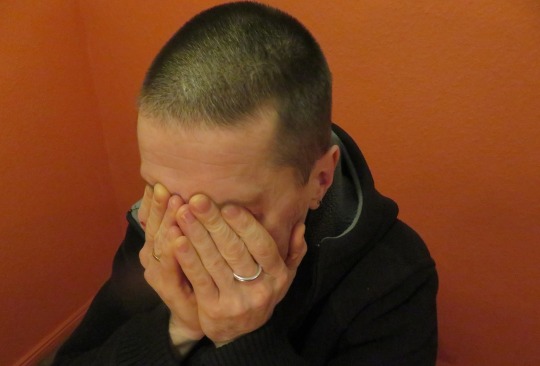
“This world is being plundered at a speed that’s just unbelievable! In another 50 years there’s going to be nothing left apart from a few rich people….”
AR: Maybe why me and Martin haven’t made a bigger impression on the film world than we have is because film isn’t the only thing we’ve got in our lives. I know other filmmakers, that’s all they’ve got! I have a lot of interests; personal happiness or enjoying myself has always come before killing yourself for the film.
DL: And yet of course with many things, having a back door is an option that can be fatal. But to work yourself into an early grave because something didn’t work in one of your films would be pretty stupid, if you think about it.
I know other people who are like that. You take away their projects, and, God, they haven’t got a life. They’ve got nothing to go home to.
Everyone has something they can’t bear. A word you don’t like to hear?
“Nigger.” “Kanake.” Any kind of detrimental references to somebody’s origins, I just think, you know, “God, is that as far as you’ve got in your life, mate?”
Unfortunately yes, in many cases.
That really – I can’t bear it. More than anything else, I just think, “Ah, man….” (sighs)
How about a concept for which there is no word that you think there should be a word for?
(Pause) There should be a word for when people wake up one day and realize the folly of what they’re doing.
It’s called “living”!
It’s not exactly a revelation, is it? They wake up one day, and see their world for what it is.
Very sobering…
…yeah, and they step into it – that stepping into that other world. But people don’t do that, you see, they don’t say, “You know what, I’m getting rid of my car,” or “I’m going to stop consuming this,” or whatever, “I’m going to stop importing the most expensive fucking caviar.” You know what I mean? I’m sorry, it’s my trip at the moment. It’s just that if you bother to spend any time looking at what’s going on… this world is being plundered at a speed that’s just unbelievable! In another 50 years there’s going to be nothing left apart from a few rich people. You’ve all these people being distracted by cars and bigger flatscreens and more mobiles and more shit on Facebook, more shit on this or that. Surely, there must be something where people wake up one day and they think, “I’ve been…!” And then they reject that, and go out and do something more interesting with their lives.
Is it fair to say you might know someone who’s had this experience?
No. You see, you’re talking to someone who doesn’t have a car, who doesn’t own property, who doesn’t eat meat…
A lot of people don’t eat meat…
I had that kind of experience. I am just not interested in this rampant cliché consumerism.
But you know, you’re not the only one. The second Deep Feature was on Brandon Cronenberg. A very unaffected person. Actually, the title of the article is, “If I Had a Chesterfield,” because he said, “Well, I sleep on this entry-level futon.” Pretty unaffected, completely under the radar. It’s kind of similar. “I don’t need a car….”
MORE DRINKS APPEAR. With them, a last round of questions. Alex flashes a grin.
DL: Paris could have become home, but Berlin won out in the end. Why?
AR: I spent quite a lot of time in Paris, because I had a girlfriend there. But I never really… I couldn’t find my way in there. Whereas the first time I came to Berlin, I was straight in; I felt right at home. You know that the first night I ever spent in Berlin overnight was in the same house as where late night shop is?
Really?
First bar in East Berlin was “Obst und Gemüse.”
We should do firsts, good idea.
First one in West Berlin was “Bar.” Skalitzer Straße. We met for a drink and went to Eiszeit-Kino and saw the midnight special of Taxi Driver. And I loved it, with the gas lights and everything; I thought, “Yeah mate, give me more!” And I liked the fact that it was just called “Bar.”
Simple, direct, yeah.
You know, I felt almost immediately… I mean, that’s true, what I said in Tom Atkins’ Blues – I found my niche. I’ve always felt very at home here. In Paris, I used to really enjoy myself, I was always in good form, but I knew there was just no way I was going to be able to find my slot, find a flat, find a way, a place to belong; whereas here, it just seemed to be shouting at me.
In those days, it was much, much easier, I have to say. How long did you live in Paris?
Well, I didn’t live there, I was just there. I lived in London and she lived in Paris, and either she was in London or I was in Paris. I used to take the boat train; it was too expensive to fly. But I spent a lot of time there…
Pretty much like me. Do you travel a lot?
Not anymore.
But you have.
Well, not really. The farthest I’ve ever been was Moscow. I’ve never been to America, never been to South America, never been to India. You know, it’s only that it was really, really expensive to fly to North America in the 80s!
It still is. I fly twice a year, maybe, and it still is.
And I didn’t always have a lot of money. Now I seem to only spend my time in Berlin or London.
Let me ask a couple of cities you’ve been to, and just give me a one word reaction to them, OK? You mentioned Moscow. In one word?
In one word?
This is like cutting down your script.
“Unbelievable.”
Unbelievable. An equivocal word. OK, London?
“Home.”
Rome?
(Pause) So long ago…
It never changes. The Eternal City.
So they say…. Last time I was in Rome was 1981.
Hasn’t changed since then.
OK! (laughs) “Dirty!” I hear Rome is dirty… in maybe more ways than one.
That may be true, OK. Madrid?
“Drunk.”
That might describe you better than the city. Barcelona?
One word to describe it? “Vibrant.”
Paris?
“Inspiring.”
Berlin?
“Home.”
Oh, you’ve done that twice.
Yeah, I think it’s OK; you can have two homes, can’t you?
At least.
Cats do!
They do. What are you going to do with the rest of today?
I’m going to check me’ e-mails, have something to eat and then go to a dinner party.
Is that a typical day?
No, it’s definitely not. You see, I hardly ever go to dinner parties. And it’s an expat dinner party, and I never go to those. It sounds terribly pretentious, but it has something to do with my status as a director that I’ve been invited.
I see. You’ve arrived!
Hobnob! A bit of expat hobnobbing, or something like that.
Oh, the evil word… you’re “networking”!
I don’t think so…
That’s what we need – a word for the concept of when you’re not really networking, but you in a way, you are.
I’m always very skeptical about that, whereas, you know, me and Martin are just trying to find a way to survive financially and still make films. It’s not ideal, but you know at least we’re doing it. You know, we’re trying to get our third one made, but we’ve made a couple of decisions about how things have to be….
Ein schönes Schlusswort. OK.
Artist link: Alex Ross
¹ Zweites Deutsches Fernsehen (major German TV station)
² series featuring films by upcoming film and TV directors
³ icon of 1980s Thatcherite Britain; catchphrase: “Gizza job” (“give us [me] a job”).

![[DL] DIRECTORS LOUNGE DEEP FEATURE NOT FOR THE MIDDLE OF THE ROOM with Brazilian offbeat filmmaker Gabraz Sanna](https://directorslounge.net/wp-content/uploads/2025/06/Gabraz_Sanna_01.jpg)
